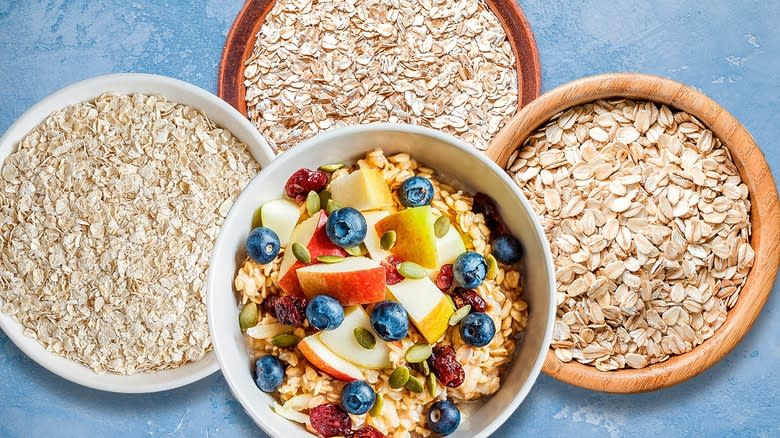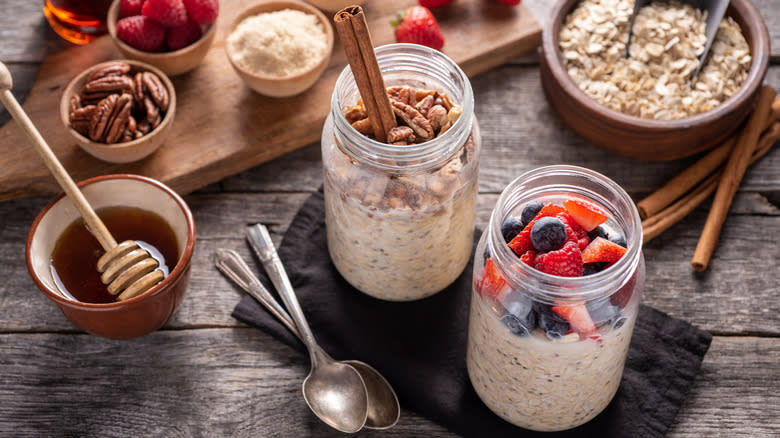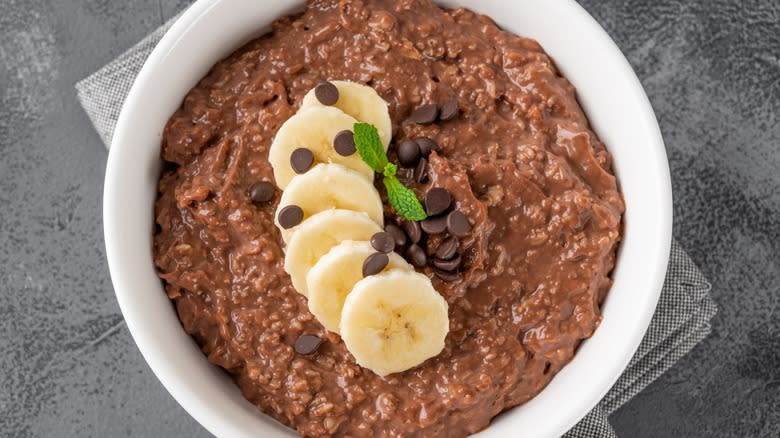How To Choose The Best Grain For Your Overnight Oats

Overnight oats might just be the perfect breakfast food for those whose cravings lean sweet in the mornings. The dish comes together quickly with just a handful of ingredients and you can whip it up in the evening, which means there's no prep in the morning when many of us are strapped for time (or running on little sleep). When you mix it up in a mason jar or similar container, it happens to be a great grab-and-go option as well. Overnight oats are also easier on the stomach than cooked oatmeal and are loaded with ingredients that provide energy and keep you feeling full, making it an ideal meal to start the day and get you through until lunchtime.
The vast majority of overnight oats recipes online use old-fashioned or rolled oats, which are also the most popular type used for making a perfect bowl of classic oatmeal, as an ingredient in the chewiest oatmeal cookies, or even as a tool for binding meatloaf. The two terms are synonymous, both referring to oat groats that have been steamed and then rolled flat (but not as flat as quick oats).
However, there are actually eight different types of oats, and you can use pretty much any of them to make overnight oats based on your textural preference or what you happen to have in your pantry at any given moment. Texturally speaking, there are two basic categories for overnight oats: firm and chewy and soft and creamy. As a rule of thumb, less processed varieties such as rolled oats, steel-cut oats, and oat groats fall into the former category, while more processed options like Scottish oats, quick oats, and instant oats fall into the latter.
Read more: 30 Healthy Snack Ideas That Won't Ruin Your Diet
The Best Oats For Firm And Chewy Overnight Oats

If there's one reason that rolled oats are the top choice for overnight oats it's because they hold up well to soaking and absorb liquid quickly, providing a toothsome bite that contrasts nicely with the creaminess of the milk or yogurt used in the recipe. Rolled oats also offer a mild flavor that works wonderfully with any fruits or spices you'd like to use, such as in our carrot cake overnight oats and strawberry overnight oats recipes, though you can also bring out pleasant nutty notes by lightly toasting the oats before incorporating them.
Steel-cut oats (which are used to make Irish oatmeal) are another excellent option in the firm and chewy category, and they offer a naturally nutty flavor with no toasting required. Because this type of oat hasn't been pre-cooked or processed, it benefits from a longer soaking time. Technically, you only need four hours to make overnight oats with rolled oats, but steel-cut oats need at least eight -- and, in our recipe for overnight steel-cut oats, we soak them for 10 to 12 hours. (Fun fact: Steel-cut oats also lend themselves well to overnight fermenting, so if you enjoy a tangy, cheesecake-like oatmeal, give this method a try.)
One final oat type you could try for overnight oats with a firm chew is oat groats. Also known as whole oats, groats are entirely unprocessed, so they require an extra step. You'll want to soak your groats for at least four hours at room temperature (or with boiling water for a softer result) before mixing them with the rest of your ingredients, and then let all of your ingredients meld overnight. Keep in mind that even then, some people don't prefer the texture of groats, so your mileage may vary!
Oats To Choose For Soft And Creamy Results

If a creamy texture is more your jam, you'll want to swing to the other end of the oat spectrum. Scottish oats are the go-to for a less chewy oatmeal that still offers a thick consistency. You can use them exactly as you would use rolled oats but they will provide a more porridge-like result. Scottish oats have a mild flavor that holds up well in any recipe — including savory ones.
Both quick oats and instant oats dish up similarly creamy results with some minor differences. Instant oats are ground more finely and, thus, will be slightly creamier, and they also often have sugar and flavors added, which means they're not as adaptable to different recipes. For this reason, quick oats are a better option for a consistency that's both creamy and light. And for a truly porridge-like breakfast, there's oat bran.
There are a few key differences between oats and oat bran. Namely, oats come from the inner part of the oat groat, while bran comes from the outer portion, which is milled into a coarse, flour-like texture. Oat bran has a flavor profile that's nutty, earthy, and slightly sweet, so you might find that you need less sweetener in your recipe (and perhaps more nuts or nut butter to complement it). It also absorbs more liquid, so plan to top it up with a bit more of your milk of choice in the morning before enjoying.
Read the original article on Tasting Table

 Yahoo Lifestyle
Yahoo Lifestyle 
